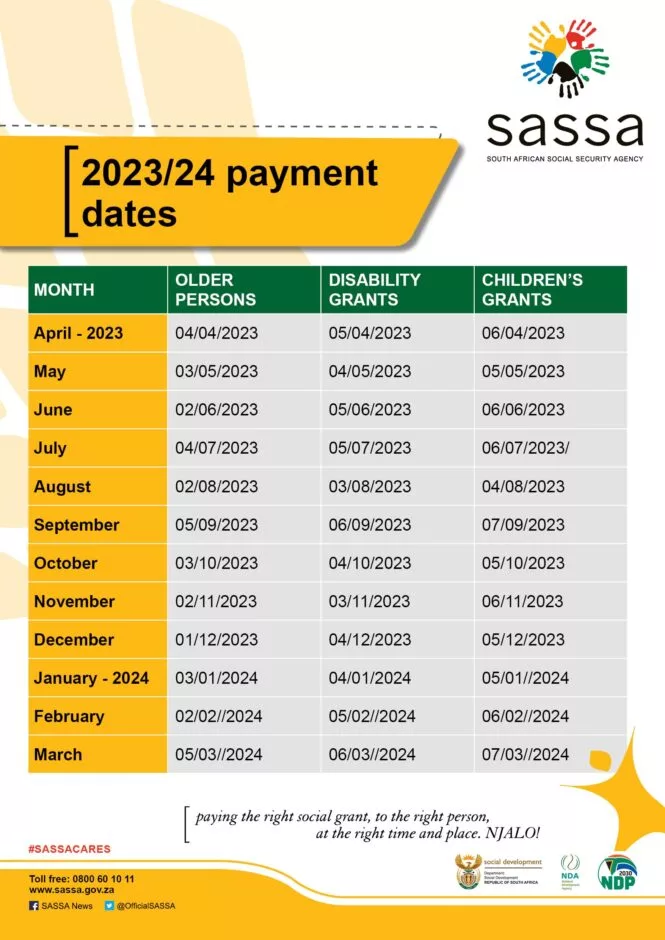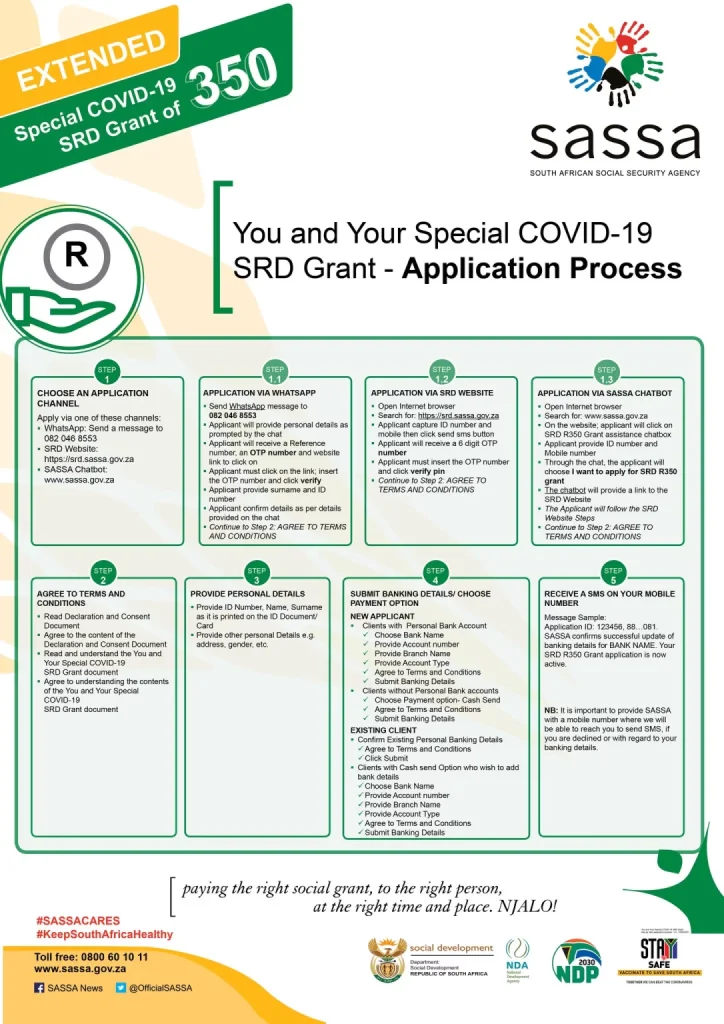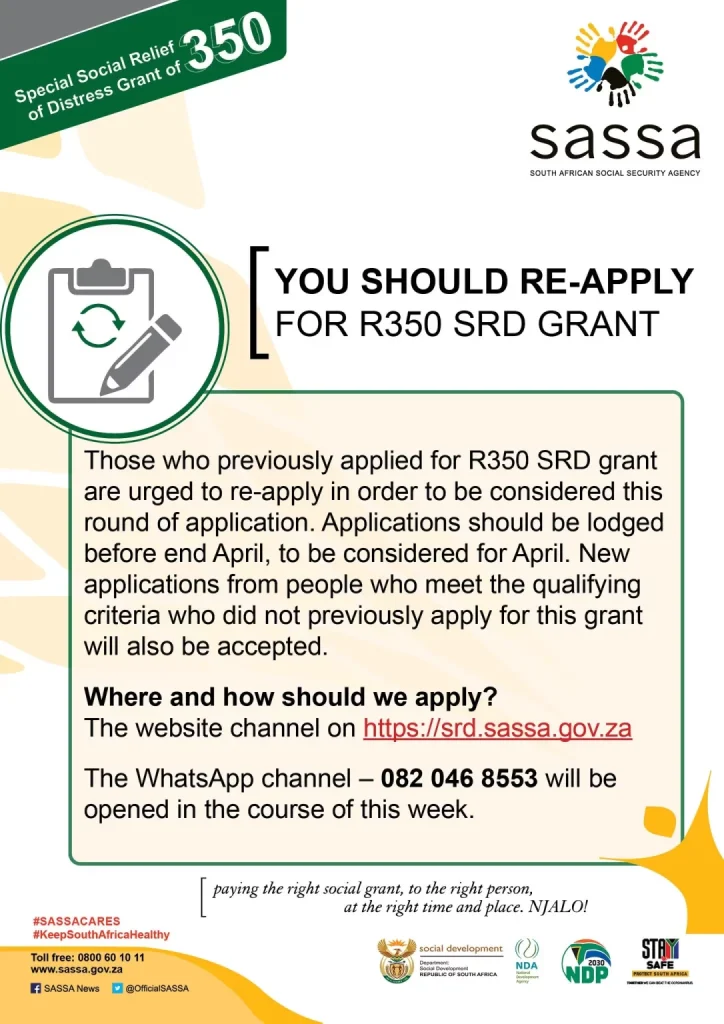Online SASSA Status Check 2024 for SRD 350
The Social Relief of Distress Grant (SRD Grant) is meant for South African Citizens, Refugees, Asylum Seekers and Special Permit Holders who are between the ages of 18 and 60 years, who have insufficient means, who do not receive social grants on behalf of herself/ himself or who are not contributing to or eligible for UIF payment, and have no financial support from any other source.
From this website you can check the status of your SASSA grant application whether it is in pending, approved, or declined. Simply, Being South African citizen you just have to put South African ID number and phone number in the SASSA status check tool box to check SASSA SRD status online.
Imp. Note for Appealing the SAASA Application Status
If your SASSA application status is declined then you have the right to appeal the SASSA department for the month in which you application was declined. The SASSA will update you with notification and reason why your application is declined. Furthermore, upon consistently appealing for the failed status of your application the original decision will remain the same.
SASSA SRD Status Check for R350 Grant Payment
Certainly! I’ll break down the process of checking the status of your R350 SASSA grant payment in simpler terms, offering detailed instructions for different methods.

Checking Your R350 SASSA Grant Payment Status
If you’ve applied for the South African Social Security Agency’s (SASSA) R350 Social Relief of Distress (SRD) grant and want to know the status of your payment, there are a few easy ways to do it.
1. Online Methods
- Go to the SASSA Website
First things first, open up your web browser and head to the official SASSA website. You can find it at [Our website]. Once there, look around the site for information related to the R350 SRD grant or checking payment status. They usually have a section dedicated to this. - Enter Your Details
You’ll probably need to provide some personal information. This might include your ID number or other details from your application. Follow the prompts on the website. It might ask you to input your ID number or other specific information. - Check Your Status
After entering your details, the website should guide you through the process of checking your R350 grant payment status. Follow the instructions given on the site.
2 WhatsApp Methods
- Add SASSA’s WhatsApp Number
If you prefer using WhatsApp, add SASSA’s official WhatsApp number to your contacts: +27 60 012 3456. - Send a Message
Open WhatsApp and send a message to this number. Ask about the status of your R350 grant payment.
Tip: Provide your ID number when prompted and follow the instructions given by the automated system.
3 Helpline Methods
- Call SASSA’s Helpline
If you’d rather speak to someone directly, call the SASSA helpline at 0800 60 10 11. - Inquire About Payment Status
When you get through to an agent, ask them about the status of your R350 grant payment. Be prepared to give your ID number and any other details they might need to find your application.

4 Using Moya App for SRD SASSA Status Check
- Download the Moya App
Go to your smartphone’s app store (Google Play Store for Android or Apple App Store for iOS).Search for “Moya App” and download/install it on your device. - Open the Moya App
Once installed, open the Moya App on your smartphone. - Navigate to SASSA Services
Look for the SASSA services or a section related to grants within the Moya App. Usually, this would be under a specific category or as a featured service. - SRD Status Check
Find the option to check the status of your SRD grant within the SASSA services section. Follow the instructions or prompts provided in the app. You might need to enter your ID number or other details related to your grant application. - Follow-Up and Confirmation
The app should guide you through the process and provide you with the status of your SRD grant application. - Troubleshooting and Support
If you encounter any issues or need assistance, look for support options within the app or contact the Moya App support team. Please note that technological interfaces and app functionalities might have been updated or changed after my last update. It’s always a good idea to check the most recent version of the app for the most accurate and up-to-date information regarding SASSA services and grant status checks.
Tip: Ensure that you have a stable internet connection and your ID number or relevant information available when using the Moya App for checking your SASSA SRD grant status.
SASSA Status Check For R350 Payment Dates For 2024
Historically, SASSA has provided payment schedules and dates for their grants through various communication channels, including their official website, social media platforms, and press releases. They typically release a schedule outlining payment dates for each month or specific periods.
To obtain the most accurate and up-to-date information on the R350 payment dates for 2024:
| Grant Month | Older Persons Grant | Disability Grant | Children Grant |
| April – 2023 | 04/04/23 | 05/04/23 | 06/04/23 |
| May | 03/05/23 | 04/05/23 | 05/05/23 |
| June | 02/06/23 | 05/06/23 | 06/06/23 |
| July | 04/07/23 | 05/07/23 | 06/07/23 |
| August | 02/08/23 | 03/08/23 | 04/08/23 |
| September | 05/09/23 | 06/09/23 | 07/09/23 |
| October | 03/10/23 | 04/10/23 | 05/10/23 |
| November | 02/11/23 | 03/11/23 | 06/11/23 |
| December | 01/12/23 | 04/12/23 | 05/12/23 |
| January – 2024 | 03/01/24 | 04/01/24 | 05/01/24 |
| February – 2024 | 02/02/24 | 05/02/24 | 06/02/24 |
| March – 2024 | 05/03/24 | 06/03/24 | 07/03/24 |
Visit the SASSA Website
Check the official SASSA website (https://srd.sassa.gov.za/sc19/status) closer to 2024. Look for updates or announcements regarding the payment dates for the R350 SRD grant. They often have a section dedicated to news or updates on grant payments.
Follow SASSA’s Official Channels
Follow SASSA’s official social media accounts (such as Twitter and Facebook) for announcements regarding grant payment dates.
Contact SASSA Directly
You can also contact SASSA directly through their helpline or customer service numbers closer to the time to inquire about the R350 payment schedule for 2024.
HelpLine: 0800601011
Email: [email protected]
How to Collect the SASSA Grant Payment?
Sure, SASSA offers various types of grants to support different needs. Here’s how you can collect payments for different SASSA grant types:
- Age Grant
A Bank Account The money is usually paid directly into a bank account. You can withdraw it from ATMs or banks. - Disability Grant
Bank Account Similar to the Old Age Grant, the money is deposited into a bank account for withdrawal. - Child Support Grant
SASSA Card Most often, beneficiaries receive a special SASSA payment card. You can use this card to withdraw money from ATMs or make purchases. - Foster Child Grant
Similar to the Old Age and Disability Grants, payments are made directly into a bank account. - Care Dependency Grant
E Bank Account Payments are made into a nominated bank account for withdrawal. - Grant-in-Aid
Money is usually deposited into a bank account for withdrawal.
Note: Ensure you have the necessary documents and meet the eligibility criteria for the specific grant you're applying for. Always keep your identification documents safe when collecting your grant. If you're uncertain about the process for a specific grant, contacting SASSA directly or visiting their website can provide accurate information.
Objective of SASSA
The South African Social Security Agency (SASSA) has several key objectives aimed at enhancing social welfare and providing support to vulnerable populations within South Africa:
- Grant Administration:
SASSA administers various social grants, including old age pensions, disability grants, child support grants, foster child grants, and more. Its primary objective is to efficiently and fairly distribute these grants to eligible individuals, ensuring financial support for those in need. - Poverty Alleviation:
One of SASSA’s central goals is poverty reduction. By providing financial assistance to vulnerable groups, especially the elderly, people with disabilities, and families with children, SASSA aims to alleviate poverty and improve the standard of living for these populations. - Social Assistance Programs:
SASSA implements social assistance programs designed to support vulnerable groups and promote social development. These programs focus on ensuring access to essential services and fostering social inclusion and empowerment among beneficiaries. - Ensuring Access to Services:
SASSA works to ensure that eligible individuals have access to the services and support they require. This includes providing information, guidance, and assistance in applying for grants, as well as offering resources to promote financial literacy and empowerment. - Emergency Relief:
During times of crisis or emergencies, such as the COVID-19 pandemic, SASSA has provided emergency relief through the Social Relief of Distress (SRD) Fund. This fund aims to offer temporary support to individuals and families facing immediate financial hardships due to crises or unforeseen circumstances. - Collaboration and Partnerships:
SASSA collaborates with various government departments, non-governmental organizations, and community-based groups to maximize its impact and reach. Partnerships allow for the effective implementation of programs and initiatives that benefit vulnerable communities.
Overall, SASSA’s objectives are centered around providing social assistance, reducing poverty, supporting vulnerable groups, and contributing to the overall well-being and social development of South Africa’s citizens.
Features and Assistance:
- COVID-19 Response:
During the COVID-19 pandemic, SASSA’s SRD Fund played a pivotal role in assisting those who lost income or faced financial difficulties due to lockdown measures and economic disruptions. It provided a temporary lifeline to millions of South Africans affected by the pandemic’s economic fallout. - Eligibility and Application:
The SRD Fund eligibility criteria vary based on specific circumstances and the nature of the crisis. Applicants typically need to apply through SASSA, providing necessary documentation and information to demonstrate their need for immediate financial assistance. - Temporary Support:
The assistance offered through the SRD Fund is temporary and aims to provide a short-term buffer for individuals or families facing financial hardships. It helps cover basic living expenses during the period of crisis or emergency.
Challenges and Enhancements:
Managing the SRD Fund has come with its own set of challenges, including the need for rapid response during emergencies, ensuring fair and efficient distribution of funds, and reaching the most vulnerable segments of society. Efforts are continually made to enhance the fund’s effectiveness, streamline application processes, and improve accessibility to ensure timely assistance.
Impact and Importance:
The SRD Fund plays a crucial role in providing immediate support to individuals and families in dire circumstances, offering them a safety net during times of crisis and helping to prevent further financial hardship.
Continued Support:
As emergencies and crises can arise unexpectedly, the SRD Fund remains a vital component of SASSA’s initiatives, ensuring that swift assistance is available to those most in need during challenging times. Efforts to improve and optimize the fund’s operations continue to be a priority for effective and timely relief provision.
Online Video Guide for SASSA status check
The SASSA R350 grant, officially known as the Social Relief of Distress (SRD) grant, is a financial aid provided to eligible South African citizens during times of crisis. Below are the eligibility criteria in simplified terms:
Application Process
Online Application, You can apply for the R350 grant online through the official SASSA website or using designated online platforms.

Verification Process
SASSA will review your application and check if you meet the eligibility criteria.
- Payment Method
If approved, the grant is typically paid through various methods like bank transfers, mobile money, or cash collections at designated pay points.
- Regular Updates
Keep an eye on official announcements and updates from SASSA for any changes or additional requirements. - Accurate Information
Provide accurate and truthful information during the application process.

Contact SASSA for Assistance
If you have questions or need help, you can contact SASSA directly for assistance. Understanding and meeting these criteria will increase your chances of qualifying for the SASSA R350 grant during times of need.
Wrapping Up
SASSA, or the South African Social Security Agency, is a government institution in South Africa that plays a crucial role in providing social assistance to eligible citizens. Its primary aim is to address poverty and vulnerability by offering various grants to those in need. Among its initiatives is the R350 grant, known as the Social Relief of Distress (SRD) grant, introduced during the COVID-19 pandemic to aid individuals facing financial challenges. This grant provides temporary relief to qualifying South African citizens, offering them financial support during difficult times.
SASSA employs a straightforward application process, usually done online, allowing eligible individuals to access the assistance they need. The agency utilizes different payment methods, including bank transfers and payment cards, ensuring that beneficiaries can conveniently collect their grants. SASSA’s efforts align with the broader goal of promoting social well-being and economic stability, making a positive impact on the lives of those facing economic hardships in South Africa.
